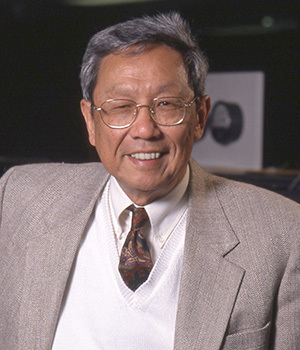
Kwang-Tzu Yang, professor emeritus of aerospace and mechanical engineering at the University of Notre Dame, died in his home Wednesday, July 29.
He will be remembered by his students and colleagues for his joy, his genuine smile and his significant contributions to the field of thermal sciences. An article in the International Journal of Heat and Mass Transfer, celebrating his 80th birthday and numerous accomplishments, described his approach to life: “Yet to him it is all simply a search for understanding and a part of the unity of knowledge…and he is always looking for new ways of stimulating the interest of his audience and of getting them to participate in the quest for understanding.”
Yang was born in Suzhou, China, in 1926 and came to the United States in 1948 to attend the Illinois Institute of Technology in Chicago. While there, he earned his bachelor’s degree in 1951, master’s degree in 1952 and completed his Ph.D. in 1955 under the supervision of Max Jakob, physicist and pioneer in the field of thermal heat transfer.
Soon after receiving his doctorate, he joined the Notre Dame faculty of the Department of Aerospace and Mechanical Engineering. He was promoted to professor in 1963, served as department chair from 1967 to 1978 and was appointed the Viola D. Hank Professor of Aerospace and Mechanical Engineering in 1986.
He received numerous honors for his contributions to the heat transfer community, including senior editorship of the Journal of Heat Transfer, North American editorship of the International Journal of Experimental Thermodynamics and Fluid Flow, Fellow of the American Society of Mechanical Engineering (ASME), the ASME Heat Transfer Memorial Award and the Foreign Research Award of the Japan Society of Mechanical Engineering. He also received the prestigious lifetime achievement award — the Max Jakob Heat Transfer Memorial Award — named for his mentor.
When he retired from Notre Dame in 1998, Yang had graduated a total of 31 Ph.D. students. Since he did not believe in a ‘restful retirement,’ he continued to serve as a guest lecturer at many leading universities throughout Asia, to enjoy his children and grandchildren and to fill his seat as a member of the viola section of the South Bend Symphony.
Early in his career Joseph M. Powers, professor of aerospace and mechanical engineering, worked with Yang on several projects and committees. “I learned a lot from K.T. Yang and thoroughly enjoyed our interactions,” Powers said. “He influenced generations of students and faculty at Notre Dame. His wisdom, leadership and scholarship were always leavened with wit, kindness and charity.”